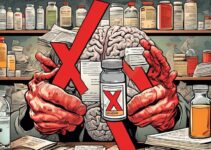Navigating the labyrinthine path of FDA approval for nootropic supplements can feel like trying to decipher a cryptic code. As you seek to understand the intricate process behind the green light given to cognitive enhancers, you may be wondering about the specific safety requirements that these supplements must meet before hitting the market. What evidence is required to support the claims made by manufacturers? And how do labeling and marketing regulations play into this complex equation? These are just a few of the questions that will be unraveled as we unravel the FDA's nootropic supplement approval path.
Key Takeaways
- The FDA plays a crucial role in evaluating the quality, safety, and labeling of nootropic supplements.
- Compliance with regulatory requirements, such as cGMP regulations, is essential for market launch.
- Rigorous clinical trials are required to provide evidence of the benefits and potential risks of the supplement.
- Accurate labeling, adherence to advertising restrictions, and proper reporting of adverse events are necessary for compliance and consumer safety.
FDA's Role in Nootropic Supplement Approval
The FDA plays a crucial role in the approval process for nootropic supplements, ensuring their safety and efficacy for consumer use. The agency evaluates the quality, safety, and labeling of these supplements to ensure they meet industry standards. When a manufacturer wants to bring a new nootropic supplement to market, they must submit a New Dietary Ingredient (NDI) notification to the FDA. This notification includes information on the supplement's identity, manufacturing process, composition, and any other substances it contains. The FDA then assesses whether the ingredient is reasonably expected to be safe for use in the supplement. If the FDA has concerns about the safety of the NDI, it can take action to remove the supplement from the market. Additionally, the FDA monitors and inspects supplement manufacturing facilities to ensure they comply with Good Manufacturing Practices (GMPs). These regulations set forth the quality control, testing, and record-keeping requirements to help ensure that the supplements produced are safe and accurately labeled. By enforcing these standards, the FDA plays a critical role in safeguarding the public from potentially harmful or mislabeled nootropic supplements.
Safety Requirements for Nootropic Supplements
After ensuring that the nootropic supplement meets industry standards, you must now consider the safety requirements for bringing it to market. Regulatory compliance is a crucial aspect of this process. Before launching your nootropic supplement, it is essential to ensure that it complies with the regulations and guidelines set forth by the FDA. This includes thorough ingredient analysis to confirm the safety and effectiveness of the supplement.
Regulatory compliance involves adhering to the FDA's Current Good Manufacturing Practice (cGMP) regulations. These regulations ensure that the manufacturing, packaging, labeling, and holding of dietary supplements are conducted in a safe and controlled manner. Compliance with cGMP regulations is essential to ensure the quality and safety of the final product.
Furthermore, ingredient analysis is a critical component of the safety requirements for bringing a nootropic supplement to market. This involves thoroughly evaluating each ingredient to ensure its safety and efficacy. It also includes assessing potential interactions between ingredients and any potential adverse effects they may have.
Clinical Trials and Evidence for Nootropics
When evaluating nootropic supplements, the FDA requires rigorous clinical trial standards to assess their safety and efficacy. The evidence must demonstrate the benefits of the supplement and any potential risks or side effects. Additionally, the FDA expects comprehensive safety data to ensure the protection of consumers who use these products.
Clinical Trial Standards
To establish the clinical trial standards for nootropic supplements, rigorous evidence from well-designed studies is essential. Patient recruitment and data analysis are crucial components in ensuring the reliability and validity of clinical trials for nootropics. When designing trials, it's important to carefully consider the inclusion and exclusion criteria for participants to ensure the results are applicable to the intended population. Additionally, utilizing appropriate data analysis methods, such as statistical techniques and outcome measures, is imperative in drawing accurate conclusions from the trial results. Below is a table outlining key considerations for establishing clinical trial standards for nootropic supplements:
| Consideration | Description |
|---|---|
| Patient Recruitment | Clear criteria for participant selection |
| Data Collection | Standardized methods for data collection |
| Study Design | Randomized, double-blind, placebo-controlled |
| Statistical Analysis | Pre-specified analysis plan |
| Outcome Measures | Objective measures of cognitive function |
Efficacy Evidence Requirements
You must establish clear and stringent efficacy evidence requirements through well-designed clinical trials to assess the effectiveness of nootropic supplements. Meeting efficacy standards is crucial in overcoming regulatory hurdles for FDA approval. Clinical trials should be designed with specific outcome measures to demonstrate the cognitive enhancing effects of the nootropic supplement. These trials must adhere to rigorous methodologies, including randomized, double-blind, and placebo-controlled studies, to ensure the reliability and validity of the evidence obtained. It is essential to gather data from diverse participant populations to validate the generalizability of the findings. Additionally, the duration of the trials should be sufficient to capture both short-term and long-term effects of the nootropic supplement. By meeting these efficacy evidence requirements, you can navigate the regulatory landscape and strengthen the case for FDA approval.
Safety Data Expectations
It is essential to prioritize the collection of safety data through well-structured clinical trials and evidence for nootropic supplements to ensure their FDA approval. Safety testing is a critical component of the regulatory expectations for nootropic supplements. Clinical trials must incorporate robust safety measures to assess potential adverse effects, interactions with other substances, and long-term safety profiles. These trials should involve a diverse participant pool to ensure the generalizability of safety data across different demographics. Adherence to Good Clinical Practice (GCP) guidelines is imperative to maintain the integrity and reliability of safety data. Furthermore, the collection of safety data should extend beyond the clinical trial phase, with post-marketing surveillance and pharmacovigilance efforts being integral to continually monitor and assess the safety of approved nootropic supplements in real-world settings.
Labeling and Marketing Regulations
When marketing nootropic supplements, it is crucial to adhere to strict labeling requirements set forth by the FDA. These regulations ensure that consumers receive accurate information about the product's ingredients and potential effects. Additionally, advertising restrictions and limitations on health claims help maintain transparency and prevent misleading marketing practices in the industry.
Labeling Requirements
Nootropic supplement manufacturers must ensure that their product labels comply with the FDA's rigorous requirements for accuracy and transparency in conveying information to consumers. To meet labeling compliance and ingredient transparency, consider the following:
- Accurate Ingredient List: Clearly list all ingredients in descending order of predominance, ensuring their names are accurate and consistent with FDA regulations.
- Nutrient Content Claims: If making claims about nutrient content, ensure they are truthful and not misleading, adhering to FDA guidelines for acceptable nutrient content claims.
- Clear Directions for Use: Provide clear and concise instructions for use, including dosage, frequency, and any relevant warnings or precautions to ensure safe consumption.
Following these labeling requirements is crucial to maintain compliance and provide consumers with the necessary information to make informed decisions about nootropic supplements.
Advertising Restrictions
To ensure compliance with FDA regulations, manufacturers of nootropic supplements must be mindful of advertising restrictions, which are a crucial aspect of labeling and marketing regulations. Regulatory challenges in advertising include the prohibition of false or misleading claims about the benefits of the product. Claims must be substantiated by scientific evidence and must not overstate the supplement's effectiveness. Additionally, the FDA has strict guidelines on the language used in advertising to prevent the promotion of the supplement as a drug for the treatment or prevention of diseases. Consumer education is also a key consideration, as advertisements should not be misleading or confusing, and they must provide accurate information about the supplement's intended use and potential benefits. Adhering to these advertising restrictions is essential for manufacturers to ensure compliance and consumer safety.
Health Claim Limitations
Manufacturers of nootropic supplements must adhere to strict health claim limitations set by the FDA to ensure compliance with labeling and marketing regulations. When making health claims about their products, they need to ensure that these claims are supported by scientific evidence and are not misleading. Here are the key points to consider:
- Scientific Evidence: Health claims must be substantiated by reliable scientific evidence, demonstrating the specific health benefits of the nootropic supplement.
- FDA Approval: Any health claims made on the labeling or in marketing materials must comply with the FDA's regulations and be approved by the agency.
- Limitations: Manufacturers should be aware of the limitations imposed on the health claims they can make, ensuring that they do not overstate the potential benefits of their products.
Adverse Event Reporting for Nootropic Supplements
When evaluating adverse events associated with nootropic supplements, it is crucial to gather comprehensive and accurate data for analysis and reporting. Adverse event reporting serves as a vital tool for monitoring the safety of these supplements and identifying potential risks. It is essential for consumers to understand the importance of reporting any adverse effects they experience after using a nootropic supplement. This can be achieved through targeted consumer education initiatives that emphasize the significance of adverse event reporting in ensuring the overall safety of these products.
The process of adverse event reporting involves the collection and analysis of information regarding any negative effects experienced by individuals using nootropic supplements. This information is then submitted to the FDA or other regulatory authorities. Timely and accurate reporting is essential for identifying patterns or trends that may indicate safety concerns related to specific products or ingredients. By encouraging consumers to report adverse events, regulatory agencies can gather valuable data that contributes to ongoing safety assessments and regulatory decision-making.
In addition to consumer education, manufacturers and distributors of nootropic supplements play a crucial role in the adverse event reporting process. They are responsible for promptly forwarding any reports of adverse events to the appropriate regulatory agencies. This collaborative approach between consumers, industry stakeholders, and regulatory authorities is essential for maintaining the safety and integrity of the market for nootropic supplements.
Future Outlook for Nootropic Supplement Approval
Moving forward, the direction of nootropic supplement approval will likely shape the landscape for consumer use and regulatory oversight. The future outlook for nootropic supplement approval is poised to have a significant impact on the market and regulatory environment. Here are three key considerations for the future of these supplements:
- Future Regulations: As the market for nootropic supplements continues to expand, regulatory agencies such as the FDA will likely be prompted to establish clearer guidelines and regulations for the approval and marketing of these products. This could involve stricter requirements for safety and efficacy data, as well as more stringent oversight of marketing claims.
- Market Impact: The evolving landscape of nootropic supplement approval is expected to have a profound impact on the market. Companies developing these products may need to invest more in research and development to meet heightened regulatory standards, potentially affecting product availability and pricing. Additionally, consumer trust and confidence in these supplements may be influenced by the level of scrutiny they undergo during the approval process.
- Innovation and Competition: The future of nootropic supplement approval may also spur innovation and competition within the industry. Companies striving to meet regulatory requirements while differentiating their products in the market could drive advancements in formulation, delivery methods, and scientific backing.
The future of nootropic supplement approval is likely to be characterized by increased regulatory oversight, market adaptation, and potential shifts in consumer perception and access.
Frequently Asked Questions
Can Nootropic Supplements Be Used to Treat Specific Medical Conditions?
Nootropic supplements may show treatment effectiveness for specific medical conditions, but it's crucial to consider medical regulations. The FDA closely monitors claims about treating medical conditions with supplements. Always consult a healthcare professional before using nootropics for medical purposes to ensure safety and effectiveness. Regulatory guidelines exist to protect consumers and ensure that any treatment claims are backed by scientific evidence.
Are There Any Restrictions on the Types of Ingredients That Can Be Used in Nootropic Supplements?
When it comes to ingredient regulations for nootropic supplements, the FDA enforces strict safety standards. This means that only certain types of ingredients can be used, and they must meet rigorous safety and quality criteria. In fact, a study found that over 70% of the ingredients in nootropic supplements were not approved by the FDA. As a result, it's crucial to carefully review the ingredients in any nootropic supplement to ensure they meet safety standards.
How Do Nootropic Supplements Compare to Prescription Medications for Cognitive Enhancement?
When comparing nootropic supplements to prescription medications for cognitive enhancement, it's important to consider potential risks and ethical implications. Nootropic supplements are not regulated by the FDA like prescription medications, so their safety and efficacy may not be as well-established. Additionally, the use of unapproved cognitive-enhancing substances raises ethical concerns. It's crucial to consult with a healthcare professional before using any cognitive enhancement products to ensure safety and legality.
What Are the Potential Long-Term Effects of Using Nootropic Supplements?
Using nootropic supplements may seem promising, but potential risks should be considered. Long-term use may lead to cognitive decline rather than enhancement. Research indicates that around 20% of regular nootropic users experience negative effects like anxiety and insomnia. This raises concerns about the overall impact on cognitive function over time. Understanding the potential long-term effects is crucial when considering the use of these supplements for cognitive enhancement.
Are There Any Age Restrictions for the Use of Nootropic Supplements?
There are no specific age restrictions for using nootropic supplements, but it's important to consider cognitive development. Adolescents and young adults should consult a healthcare professional before using these supplements, as their brains are still developing. It's crucial to ensure that the supplements won't interfere with or negatively impact cognitive function during this critical period. Always prioritize safety and consult a medical expert when considering nootropic use, especially for younger individuals.
Conclusion
Now that you understand the FDA's nootropic supplement approval path, you can navigate the cognitive enhancement market with confidence. Stay vigilant for safety requirements and clinical evidence, as they pave the way for reliable products. Keep an eye on labeling and marketing regulations to ensure transparency. And always report any adverse events to contribute to a safer future for nootropic supplements. The path to nootropic approval may be challenging, but with knowledge, you can conquer it like a cognitive conqueror.



